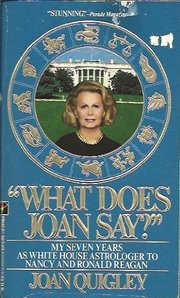Author: John
Rose Hips on a Cold November Day
Let’s Quiz GOP Presidential Candidates about the Reagans’ Astrologer
 Tired of hearing about Obamacare, immigration, taxes, and Ebola? Dreading hearing about these things endlessly in the 2016 presidential debates? Don’t you wish we had something new to discuss with the candidates?
Tired of hearing about Obamacare, immigration, taxes, and Ebola? Dreading hearing about these things endlessly in the 2016 presidential debates? Don’t you wish we had something new to discuss with the candidates?
Well, jump for joy, because we do—thanks to a recent New York Times obituary reminds us that Ronald Reagan, the man revered by today’s GOP as the exemplar of American presidents, consulted an astrologer on matters ranging from Air Force One’s flight plans to the timing of international summits. Joan Quigley was the administration’s “most closely guarded secret,” according to former Treasury secretary Donald Regan. Nancy consulted the San Francisco-based astrologer three times a day and paid Quigley a handsome $3,000 monthly retainer for most of the Ronnie’s two terms.
Here’s the colorful American history we’ve been looking for to enliven what might otherwise might just be another tiresome political campaign. Gwen Ifill and Bob Schieffer are probably busy, so I’ve gone ahead and drafted some initial debate questions. Let’s ask the candidates . . .
1. When were you born? I mean, exactly: what month, day, year, and time?
2. Nancy selected the astrologer for the Reagan White House. Do you believe that the duties of selecting the White House astrologer should be left to the First Lady? What role should the President play? Should this position require a Senate confirmation hearing?
3. The Reagans regularly consulted their astrologer about a broad range of topics, including highly important meetings with President Gorbachev of the Soviet Union. Are there any areas of domestic or foreign policy where you feel that an astrologer would be especially critical? Are there any areas where, breaking from the precedent of the Reagan White House, you would not consult an astrologer?
4. Throughout your campaign, you have been a strident supporter of calls to return this nation to its Judeo-Christian heritage. How much of your fervor about this issue derives from sincere religious conviction and how much from your just being a Taurus?
5. Would your White House complement astrology with any other forms of divination, such as casting lots or reading sheep and poultry entrails?
6. Will you be paying for your astrologer out of your own funds, or will his or her expenses be covered by taxpayers?
7. Do you feel that having an astrologer might have helped the GOP field more successful candidates in 2012? Could anything at all, terrestrial or extraterrestrial, have helped the GOP field more successful candidates in 2012?
8. Every administration makes it mark on life in the capital through its own strict or lenient interpretation of protocol. At State Dinners and on other official White House occasions, would the American public have the opportunity to see your administration’s astrologer dressed in flowing velvet robes and a pointy hat?
Fall Has Become a Slow Withering
Overwintering Tubers
Farmstand Bouquets
Multiflora Roses
Some Deft Storytelling by Jason Isbell
I hadn’t heard of country singer-songwriter Jason Isbell until I read Dwight Garner’s story about him in the New York Times. Now I’m a fan. His albums Here We Rest and Southeastern are getting a lot of play in my office. I’m also enjoying Catching Lightning, a CD by Jason’s wife, Amanda Shires. She’s a wonderful singer, songwriter, and fiddle-player.
One of the things I like best about Jason’s songs is their colorful but concise story-telling. I’m particularly impressed by the how much ground he covers in just a few lines in his song, “The Songs She Sang in the Shower.”
There are countless country songs in which a singer pines for a former lover. This song belongs to that tradition, but it’s stranger and deeper than any conventional twangy lament. Isbell could begin on a note of rue or yearning. Instead, he begins with some cheap bravado, and in about eight lines tells us more about two people and why they broke up than most song writers could describe in eight or ten verses.
The song begins cryptically; we don’t know what’s going on or who’s speaking to whom. In the first and third lines, the singer pauses between the first three words and the second three words. I’m going to break those lyrics in two here to help convey the effect of the phrasing:
On a lark
On a whim
I said “There’s two kinds of men in this world and you’re neither of them”
So far, we’re not in a break-up song at all. One guy is insulting another guy is a rather pedantic way.
And his fist
The pause lets us linger on this. The quip didn’t go well, and the recipient is responding with a punch.
Cut the smoke
Not cut the “air,” but the “smoke,” which tells us where we are: a crowded smokey bar, where one guy is picking a fight with another. (“Smoke” also sets up a rhyme in the next line, but it’s perfect on its own.)
I had an eighth of a second to wonder if he got the joke
The singer is so proud of his cleverness, that even as he’s about to be punched, he’s wondering if his jibe has been appreciated.
In the car
Headed home
She asked if I had considered the prospect of living alone
This is a great cinematic cut. He’s doesn’t linger on the bar fight. He doesn’t make some wry, wistful remark about how he got decked. He jumps to the painful, quiet ride home, in which his girlfriend, who we know now has seen too many of these fights, informs him she’s had enough.
With a steak
held to my eye
I had to summon the confidence needed to hear her goodbye,
And another brief chapter without any answers blew by
And there it is. He’s been punched in the eye and dumped in the same evening. He’s still acting: summoning confidence now, instead of turning out clever insults. He listens—and she’s gone.
He’s mystified. Things are not going well. He makes a joke, and he gets punched. He girlfriend dumps him, and he’s looking for answers. All he can do now is rue, reminisce, and wonder. (There’s a certain passivity to his character: he acts out and then watches the results, however painful they might be.)
In just eight lines, we’ve been given a rich and jarring portrait of two people. He’s clever but swaggering and reckless. Eventually she’s had enough of the trouble that swagger and recklessness stirs up. (How many other times has she had to pull him away from a fight? we wonder.) We get a sense of her patience and tact. She doesn’t storm out of the nightclub. She waits until they’re in the car to talk to him.
The rest of song is devoted to the singer’s longing and remorse. He’s alone now, appraising his lonely life and praying for something better. I particularly admire the couplet:
And the church bells are ringing for those who are easy to please
And the frost on the ground probably envies the frost on the trees
That’s fine song-writing.
You can listen to the whole song here:
Lilacs
The Land According to Emerson
The land is the appointed remedy for whatever is false and fantastic in our culture. The continent we inhabit is to be physic and food for our mind, as well as our body. The land, with its tranquilizing sanative influences is to repair the errors of a scholastic and traditional education, and bring us into just relations with men and things. The habit of living in the presence of these invitations of natural wealth is not inoperative, and this habit, combined with the moral sentiment which, in the recent years, has interrogated every institution, usage, and law, has naturally, given a strong direction to the wishes and aims of active young men to withdraw from the cities and cultivate the soil.
—Ralph Waldo Emerson







